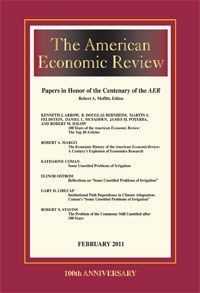
Levy, S. and \Van Wijnbergen\, S. (1992). Agricultural adjustment and the Mexico-USA Free Trade Agreement American Economic Review, :42--65.
-
Affiliated author
-
Publication year1992
-
JournalAmerican Economic Review
Provides fresh insights into the implications of a North American Free Trade Area. Their applied general equilibrium model of the Mexican economy focuses on agricultural interactions with other sectors and the effect of changing external boundaries. Agriculture is a highly protected sector in the Mexican economy and so liberalisation may be expected to have considerable income and employment effects. The study shows that the consequences for income distribution within the rural areas, and for relations between agricultural and other economic sectors, is sufficient cause for concern to merit the development of carefully targeted government compensatory schemes. The gradual implementation of the free trade agreement is similarly seen to be preferable on welfare grounds to its sudden introduction, as this dampens the transitional adjustment costs and facilitates adjustment through migration and the rural labour market. There is a discussion by D.Cohen. -from Editors